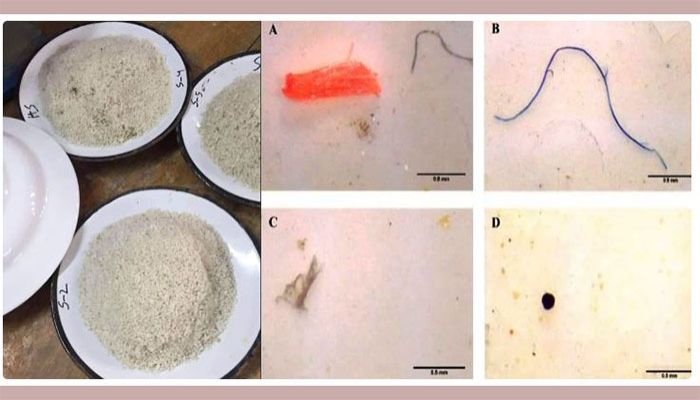
NSTU Correspondent
Publish: 19 Oct 2022, 09:20 pm

A group of researchers from the Department of Fisheries and Marine Sciences at NSTU has confirmed the presence of microplastics in five widely marketed brands of food salt || Photo: NSTU Correspondent
A group of researchers from the Department of Fisheries and Marine Sciences at Noakhali Science and Technology University (NSTU) has confirmed the presence of microplastics in five widely marketed brands of food salt. In the meantime, their research results have been published in the international journal Chemosphere under the title 'Microplastic Contamination in Processed and Unprocessed Sea Salts from a Developing Country and Potential Risk Assessment.
The researchers collected 15 samples of 5 brands of salt and 45 raw samples from 15 salt-producing factories located in Cox's Bazar and tested them with the standard of internationally accepted methods. They found that marketed refined salt contained 157 microplastics and unrefined salt contained 195 microplastics per kilogram which is 2-3 times more than other countries. Most microplastics are below 0.5 millimetres, transparent and fibrous. By chemical analysis, they found that salts contained 5 types of polymers mainly polyethylene, polypropylene, polyethylene terephthalate, polystyrene, and nylon in nature. Among these, the terephthalates are high in sense of amount.
According to the researchers, microplastics in refined salt belong to the fourth and fifth classes according to the pollution index indicating that these polymers are harmful to the human body. This suggests that microplastics are not being removed in the refining process, and more scientific research is needed on this method. Plastic waste thrown away by the public somehow ends up in the sea. Over time, this plastic waste is broken down by ocean waves, oxidation by the sun's ultraviolet rays, or biological processes into tiny particles known as microplastics. Although various countries have done extensive research on this issue by finding out the harmful aspects of microplastics, the number of research in Bangladesh is very negligible.
On the other hand, due to low production cost, ease of use, and light but strong, the use of plastic in the production of various daily-use products, industrial products, pharmaceuticals, and other materials is increasing in the world. Only in 2021, around 367 million tons of plastic have been produced all over the world. Microplastics are found in a variety of environmental ecosystems and have even been found in deep-sea sediments and on the summit of Mount Everest.
The head of the research team Dr. Belal Hossain said that microplastic pollution is a serious threat to the marine environment, ecology, and food security. The spread of microplastic pollution has already been found in various environments around the world. Various studies have shown that various chemicals including polybrominated di-phenyl ether (PBDE), bisphenol A, and phthalates are released from microplastic particles. They can cause various cancers and reproductive diseases. Various studies have shown that these hazardous substances can accumulate at different levels of the food chain such as zooplankton, oysters, worms, crustaceans, corals, fish, and seabirds. As plastic is not easily digested, animals suffer from starvation and eventually starve to death. There is a possibility of extinction of various animals. Some harmful chemicals are also released into the environment from these tiny plastic particles which disrupt the normal functioning of the environment's ecology. As the recycling of microplastics is very long or does not take place, this pollution can have a serious impact on ecosystems and food cycles if necessary measures are not taken. Since there has been very little research on microplastic pollution in Bangladesh so far, there is a need for more extensive research on this issue.
Currently, microplastic pollution has become a cause of concern for researchers. Because microplastics are spread all over the world. As a result, scientists have confirmed its presence in many other organisms including humans. Recently, microplastics have also been found in breast milk.
The research was conducted by the professor of fisheries and marine science department of the university. Mohammad Belal Hossain and Master's students of the same department Asaduzzaman Noor and Partha Banik.
The research team confirmed the presence of microplastics in the sediments of the two main beaches of Bangladesh, Cox's Bazar and Kuakata Beach, and the results of their research "Abundance and characteristics of microplastics in sediments from the world's longest natural beach, Cox's Bazar, Bangladesh" and "Microplastics in Sediment of Kuakata Beach, Bangladesh: Occurrence, Spatial Distribution, and Risk Assessment" is published in top international journals Marine Pollution Bulletin and Frontiers in Marine Science.
Subscribe Shampratik Deshkal Youtube Channel
© 2024 Shampratik Deshkal All Rights Reserved. Design & Developed By Root Soft Bangladesh